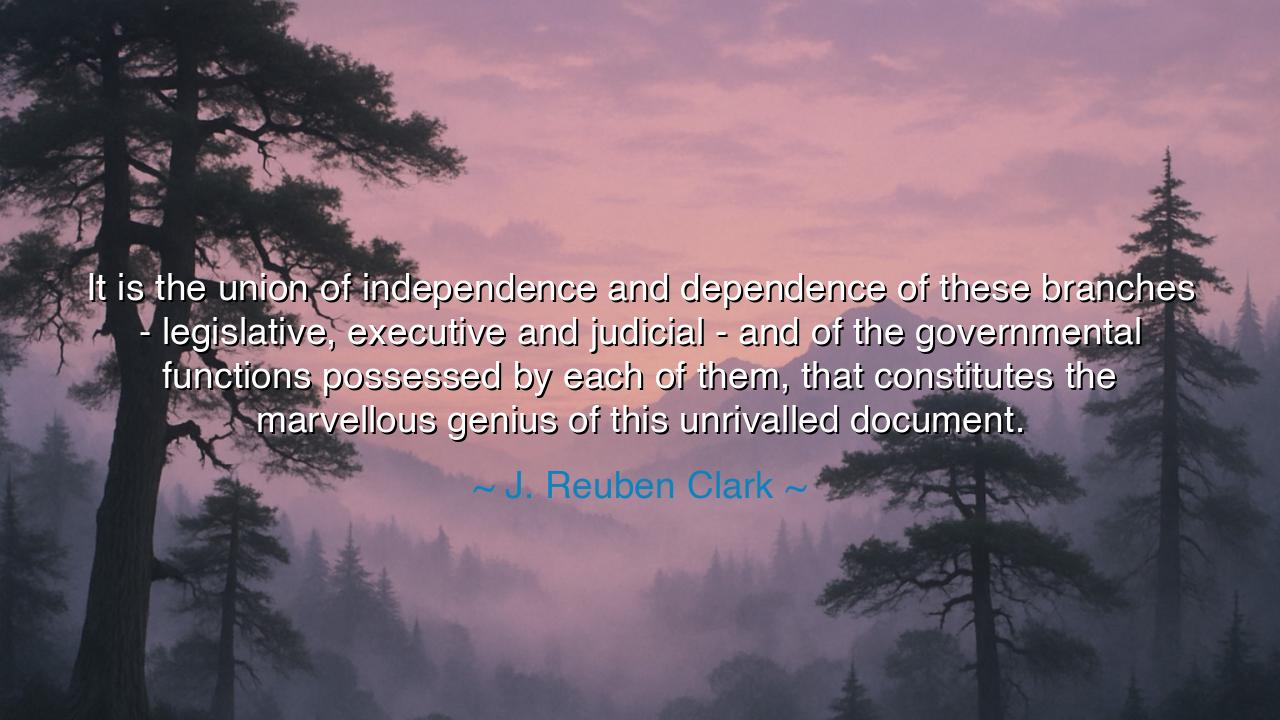
It is the union of independence and dependence of these branches
It is the union of independence and dependence of these branches - legislative, executive and judicial - and of the governmental functions possessed by each of them, that constitutes the marvellous genius of this unrivalled document.






“It is the union of independence and dependence of these branches — legislative, executive, and judicial — and of the governmental functions possessed by each of them, that constitutes the marvellous genius of this unrivalled document.” — J. Reuben Clark
In these reverent and discerning words, J. Reuben Clark, a scholar and statesman, unveils the sacred harmony that lies at the heart of the Constitution of the United States — that living covenant of liberty. His insight speaks to the delicate balance of independence and dependence that holds the machinery of governance together, not as a rigid structure, but as a symphony of reason and restraint. Each branch — legislative, executive, and judicial — stands apart, sovereign in its purpose, yet bound to the others by mutual necessity. It is this tension, this unity through separation, that Clark calls the marvellous genius of the document. He reminds us that freedom does not spring from absolute power nor from lawless autonomy, but from the disciplined harmony of parts working for a common good.
The meaning of this quote lies in the eternal truth that strength is born not from domination, but from balance. Clark speaks of independence, that sacred right of each branch to act without coercion — to make laws, to execute them, and to interpret them according to conscience and law. But he also speaks of dependence, the humble recognition that no branch, however mighty, can preserve the nation alone. The legislature may craft the law, but it must look to the executive to enforce it, and to the judiciary to guard it against abuse. Likewise, the executive must yield to the law’s authority, and the judiciary must submit to the limits of its interpretation. In this dance of powers — neither wholly free nor wholly bound — lies the enduring strength of the republic.
The origin of these words rests in the wisdom of the Founding Fathers, who, through long toil and bitter memory, understood that unrestrained power is the mother of tyranny. Having tasted the despotism of kings, they sought a new design — not of man ruling man, but of law ruling all. They built a system where power would be divided, so that each branch could check and balance the others, ensuring that no single hand could seize control. Clark, centuries later, recognized that this design was not merely a clever mechanism of governance, but a reflection of divine order itself — a harmony of opposites, like the balance of night and day, or the union of justice and mercy. The Constitution, in his eyes, was not only a political instrument but a moral miracle.
To see this truth in action, one need only look to the great trial of Abraham Lincoln, the sixteenth President of the United States. During the Civil War, the balance between independence and dependence was tested to its limit. Lincoln, burdened with the preservation of the Union, wielded executive power with firmness — suspending habeas corpus, commanding armies, and issuing the Emancipation Proclamation. Yet even in the fires of war, he did not seek to rule as a monarch. He submitted to Congress, to the courts, and to the judgment of the people. His strength lay in his restraint — his understanding that his power was great, but not infinite; that his authority existed within the frame of the Constitution. In that humility, Lincoln preserved not only the nation’s unity but the spirit of its founding balance.
The genius of this system, as Clark observed, is that it binds the strong with the cords of law and raises the humble through the same. It teaches that independence without accountability becomes arrogance, and dependence without freedom becomes servitude. In this balance, nations find longevity; without it, they crumble into chaos or tyranny. When the branches respect their boundaries yet cooperate in their purposes, government becomes not a chain, but a living body — one mind with three hearts, each beating in rhythm with the others. Clark’s words, though written in the calm of the twentieth century, echo the eternal principle that freedom requires both liberty and law, neither supreme, both sacred.
The lesson that this quote imparts is not confined to governments, but extends to every sphere of human life. For in families, in communities, in the soul itself, harmony is found not in the triumph of one will over another, but in the balance between self-reliance and cooperation. A person who insists on total independence becomes isolated, while one who leans entirely on others becomes powerless. True wisdom lies in learning to act freely while respecting the limits that bind us together. The same is true for nations: independence without order breeds anarchy, and dependence without freedom breeds oppression. Between these two extremes stands the golden mean — the harmony that sustains all virtue and civilization.
Therefore, let these words of J. Reuben Clark be remembered as a guide for all generations: that the marvellous genius of the Constitution — and indeed of life itself — lies in the sacred union of independence and dependence. Let every citizen cherish the separation of powers not as a sign of division, but as a proof of wisdom. Let leaders act boldly within their bounds, and let the people remain ever vigilant that the balance be preserved. For as the ancients taught, harmony is the soul of order, and order the guardian of freedom. When independence and dependence walk hand in hand, justice is secure, peace endures, and the light of liberty burns forever bright upon the earth.






AAdministratorAdministrator
Welcome, honored guests. Please leave a comment, we will respond soon